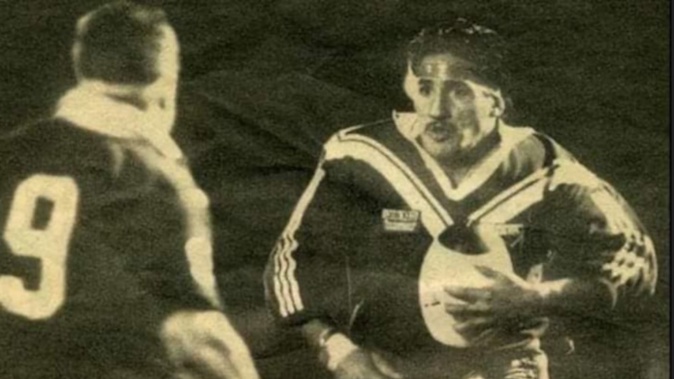
A woman charged with fatally stabbing a representative rugby league player after he barricaded himself in her home and wrapped a string around her neck has walked free after prosecutors abandoned the case.
It’s understood lawyers planned to argue the woman was a long-term victim of domestic violence if the case went to trial and that the killing was committed in self-defence.
The woman faced a maximum sentence of life in prison if convicted of killing her former partner.
But the Crown dropped the case after reviewing the available evidence against the Solicitor-General’s prosecution guidelines.
According to the Crown summary of facts, former New Zealand Māori rugby league player Neville Ramsay faced a charge of contravening a protection order at the time of the stabbing.
The protection order had previously been granted to the woman and court-imposed bail conditions meant Ramsay was not allowed to associate with her.
Family Court reporting restrictions prevent the Herald from naming the woman.
Despite this, Ramsay, also known as Rambo, arrived at the woman’s apartment one morning in December 2023.
The Crown case then alleged that soon after he entered her home, a verbal and physical argument ensued.
The woman placed a knife in her bra after the verbal altercation began.
Then in an attempt to barricade himself, the woman and their child inside, Ramsay placed a trolley over the front door.
The woman attempted to ring an alarm bell for help, but no one responded.
She then sat down on the couch and told Ramsey to leave.
“When he did not leave the apartment and continued to swear at [her], [she] informed Mr Ramsay that she had a knife inside her bra.”
The summary said Ramsay came towards her with a string and wrapped it around her neck from behind, causing her to struggle to breathe.
“While he held the string around her neck, [she] removed the knife from her bra and stabbed Mr Ramsay’s right upper thigh.”
Police arrived at the scene shortly after and observed Ramsay was motionless and appeared to be unconscious.
“Police proceeded to perform immediate first aid on Mr Ramsay. Despite this, Mr Ramsay died as a result of the injury he had sustained.”
When spoken to at the scene the woman said she was defending herself.
Because the charges against the woman were withdrawn, the Crown case as reported in this story remains untested.
At an April hearing in the High Court at Auckland, where the application to withdraw the charge was approved, defence lawyer Lester Cordwell said they were concerned about the woman’s safety.
He said he understood Ramsay’s family were “extremely upset” after being told of the Crown’s decision to withdraw the charge.
Publication of the decision, he said, “might actually reopen a wound”.
However, no non-publication order was issued.
Cordwell was approached for comment.
 Crown prosecutor Claire Paterson. Photo / Sam Hurley
Crown prosecutor Claire Paterson. Photo / Sam Hurley
Prosecutor Claire Paterson said the Crown determined the case no longer met the test for prosecution in the Solicitor-General’s guidelines.
Retired University of Auckland law professor Bill Hodge said, based on Herald information provided to him, it sounded like a logical case to drop.
“I can’t imagine it would have much success at getting a conviction and the Solicitor General’s guidelines say don’t bring a case if you don’t have a chance of getting a conviction,” he said.
 Retired Auckland University law professor Bill Hodge. Photo / Brett Phibbs
Retired Auckland University law professor Bill Hodge. Photo / Brett Phibbs
Hodge told the Herald it was not that rare for charges to be dropped as sometimes when they are laid an investigation is incomplete or a witness may change their view.
“Prosecutions are a process, not an instant snapshot in time and prosecutions change.
“More power to them that they’re able to say, ‘Look, we now know more than we did, so new information means we should change our mind’. Rather than saying, ‘No, it would look bad for us to change our mind’.”
Family violence educator Shine said the case sounded tragic.
Senior trainer Mira Taitz said she didn’t know the details of the case but in general, violent partners used a range of tactics to control, frighten and intimidate their partner.
“Women experiencing violence are constantly resisting violence in many ways, but the perpetrator of violence anticipates and shuts down their resistance.
“She becomes more and more entrapped, running out of options to resist and escape the violence.”
Following Ramsay’s death, some rugby league clubs shared tributes, acknowledging his history with the sport and offering condolences to his family.
Additional reporting Craig Kapitan.
FAMILY VIOLENCE
How to get help: If you're in danger now:
• Phone the police on 111 or ask neighbours or friends to ring for you.
• Run outside and head for where there are other people. Scream for help so your neighbours can hear you.
• Take the children with you. Don't stop to get anything else.
• If you are being abused, remember it's not your fault. Violence is never okay.
Where to go for help or more information:
• Women's Refuge: Crisis line - 0800 REFUGE or 0800 733 843 (available 24/7)
• Shine: Helpline - 0508 744 633 (available 24/7)
• It's Not Ok: Family violence information line - 0800 456 450
• Shakti: Specialist services for African, Asian and Middle Eastern women and children.
• Crisis line - 0800 742 584 (available 24/7)
• Ministry of Justice: For information on family violence
• Te Kupenga Whakaoti Mahi Patunga: National Network of Family Violence Services
• White Ribbon: Aiming to eliminate men's violence towards women.
How to hide your visit:
If you are reading this information on the Herald website and you're worried that someone using the same computer will find out what you've been looking at, you can follow the steps at the link here to hide your visit. Each of the websites above also has a section that outlines this process.
Take your Radio, Podcasts and Music with you









